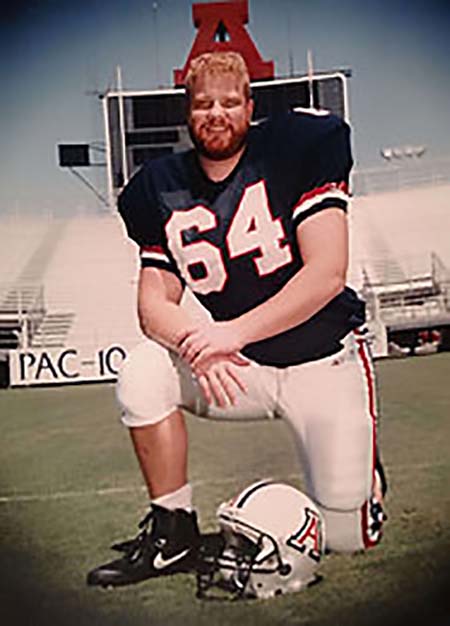
Warner Smith
All Warner Smith wanted was a fighting chance, and like he did on the gridiron at San Manuel High School then the University of Arizona, Smith fought hard until the end.
Smith passed away on Tuesday, Jan. 2, 2018. He is survived by his wife Becky and daughter
Carlee. Our deepest sympathies and prayers go out to Warner’s family and friends.
Smith, who grew up in San Manuel and resided in Tucson, was diagnosed with Amyotrphic Lateral Sclerosis (ALS), more commonly known as Lou Gehrig’s disease.
ALS is a rapidly progressive, invariably fatal neurological disease that attacks the nerve cells (neurons) responsible for controlling voluntary muscles. The average life expectancy once an individual is diagnosed is 2 – 5 years.
No cure has yet been found for ALS.
Smith was diagnosed nearly four years ago.
A 1991 graduate of San Manuel High School, Smith earned a football scholarship to the University of Arizona (1991-94), where he was an All-Pac 10 offensive lineman. He was drafted by the Indianapolis Colts and enjoyed a brief NFL career before it was ended by injuries.
His San Manuel upbringing made him an admiral opponent versus ALS
“Growing up in a mining town instilled a level of toughness that helped me throughout my whole career,” Smith told the Miner during an interview in 2016. “It was a childhood and a high-school career that I wouldn’t trade with anybody.”
“I think I was incredibly lucky to be raised in the miners’ lifestyle that I don’t think exists anymore,” he added. “When the mine was still open there was commonality between everyone that was there and that was special. I don’t think you can find that anywhere else.”
Tucker Johnson, a lifelong friend, classmate and teammate of Smith’s, called the pair’s friendship “one in a million.”
“Obviously, Warner has been a big part of my life since I attended school,” Johnson said. “To see him and know what he and his family going through now really breaks my heart because this guy is a machine and he always was. To see that machine kind of break down in front of our eyes is tough.”
“He’s more of a brother than a friend,” he continued. “To see someone that I love like that and know what he is going to go through, that’s why I’m doing everything I can to help.”
Johnson is one of what he called a “chore group” of friends who have known each other for 35 years. They still hunt and “hang out” together.
Why has the small, close-knit group remained so close of the years?
“Probably because I guess we’re all nuts,” Smith responded in jest. “Just being from the Tri-Community I think everybody understands each other in a way, and has things in common with people, (that’s different) from others who aren’t from the area.”
It’s been that group of friends and more who have to come together to support the man Hopkins called a “local hometown hero.”
“On the day I learned of my diagnosis, which was before the Ice Bucket Challenge, nobody really knew what ALS was,” Smith recalled. “I can remember feeling like I was the only person on the planet and it was a very lonely feeling.”
“I’ve completely did a one-eighty from that,” he continued. “I’m touched and honored from the support I’m receiving from people.”
Smith called himself the “same guy as always,” despite having to move around by a scooter. He continued working at his full time job and enjoyed hunting and fishing through his illness.
Although he was keenly aware of his circumstances, as he said in a video produced by the Muscular Dystrophy Association, Smith knew some live with ALS for 20 years or more. His doctor says his diagnosis is slowly progressing and called ALS the “Snowflake Disease” – it affects everyone differently.
Smith said he tried to approach each day like his father did when his dad was fighting brain cancer – with dignity and not feeling sorry for himself.
“You can’t wake up in the morning with a doomsday scenario,” he said. “You have to keep living.”
When asked how he defined “a chance,” Smith answered no differently than you might expect anyone else with a wife and children, and without ALS.
“I want everything out of life that everyone else does and dreams of,” he said. “You want to watch your daughter grow up and you want to spend time with my wife. You want all of those things that everybody else has. I’m going to wake up every day and fight for those things just like everybody else does.”
